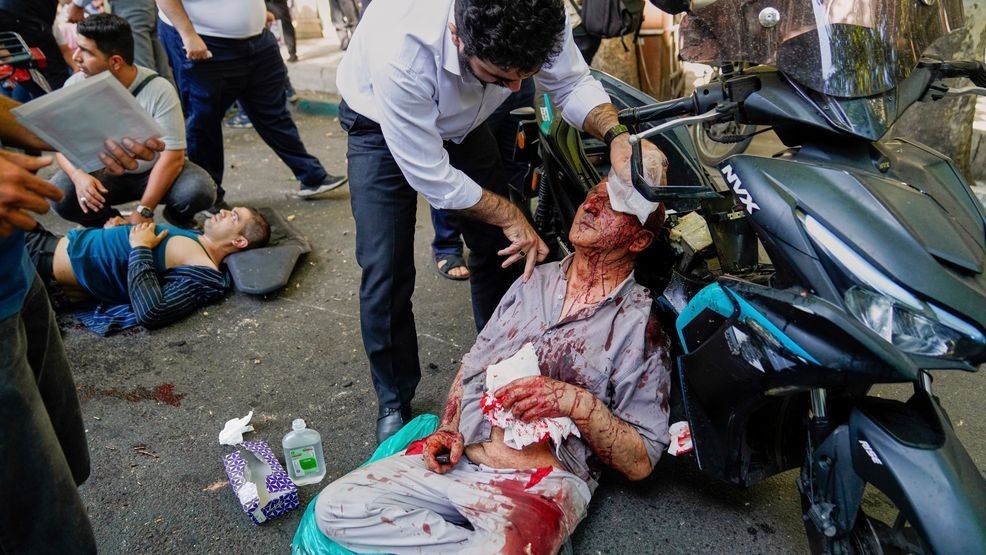On Monday, Israel launched an attack on a state-run Iranian television station during a live broadcast, prompting reporters to flee as an explosion shook the studio. This incident followed Iran’s missile barrage against Israel that has resulted in at least eight fatalities.
Israeli Prime Minister Benjamin Netanyahu stated that the airstrikes have set back Iran’s military capabilities by a significant margin, though he clarified that Israel does not seek to overthrow the Iranian government. “The regime is very weak,” he asserted during a news conference, revealing that he maintains daily communication with U.S. President Donald Trump. As he spoke, explosions were audible in Tehran.
Prior to the assault on the television facility, Israel issued evacuation warnings for hundreds of thousands of residents in central Tehran, an area that encompasses crucial sites including the state TV headquarters and major hospitals. The military claimed to have established aerial dominance over Tehran, enabling operations in the city without facing serious threats.
Trump, attending the G7 summit in Canada, reiterated his position against Iran acquiring a nuclear weapon. In a social media post, he declared, “IRAN CAN NOT HAVE A NUCLEAR WEAPON,” criticizing Iran for not signing a deal intended to avert what he termed a “shame and waste of human life” following last week’s attacks. He urged, “Everyone should immediately evacuate Tehran!” Following this, White House press secretary Karoline Leavitt announced Trump would return to Washington a day earlier due to escalating tensions.
The Israeli military’s evacuation warning affected approximately 330,000 people living near state media outlets and critical infrastructure in Tehran. Earlier on the same day, the live broadcast of Iranian state television abruptly ceased after the building sustained hits, with reports confirming four bombs struck the facility.
An Iranian state television reporter, while on air, described the chaos in the studio filled with dust, commenting on the “sound of aggression against the homeland” before shots of an explosion cut off her transmission. The network later confirmed that some staff were injured; their live programs were subsequently moved to another studio.
Israeli military spokesperson Brigadier General Effie Defrin stated that Israeli forces had achieved “full aerial superiority” over Tehran, claiming the destruction of more than 120 missile launchers, a third of Iran’s total, and two F-14 aircraft utilized to target Israeli sorties. The military also reported strikes on 10 command centers associated with Iran’s Quds Force.
In retaliation, Iran disclosed the launch of approximately 100 missiles, vowing further actions after extensive Israeli strikes on its military and nuclear assets. Thus far, the conflict has resulted in 24 fatalities and over 500 injuries in Israel, while one missile caused damage near the American consulate in Tel Aviv.
The hostilities intensified as Israel targeted the Iranian military’s leadership, nuclear scientists, and strategic locations, asserting the necessity to impede Iran’s progression toward nuclear capability. Despite Iran’s claims that its nuclear endeavors are peaceful, the International Atomic Energy Agency has warned that Tehran possesses sufficient enriched uranium for multiple nuclear weapons.
Major explosions were reported in Tel Aviv, Petah Tikva, and an oil refinery in Haifa, where an attack resulted in the deaths of three workers. This strike was one of several that have left many injured and further fueled calls for Israeli military action.
Petah Tikva resident Yoram Suki expressed his resolve despite the devastation to his home, stating, “It’s totally worth it. This is for the sake of our children and grandchildren.” Emergency services reported numerous casualties as first responders continued searching for those trapped under rubble.
The conflict shows no signs of abating. Iran’s foreign minister, Abbas Araghchi, hinted at a possible outreach to the U.S. for diplomatic intervention, stating that it could help quell the hostilities. Araghchi declared, “It takes one phone call from Washington to muzzle someone like Netanyahu,” suggesting that such moves could facilitate a return to negotiations.
As the violence escalates, both sides have amplified their military responses, raising fears of a broader regional conflict. Reports indicate that Iran’s death toll may be significantly understated, with some advocacy groups suggesting over 400 fatalities, including civilians. Amidst the turmoil, Iran has detained various individuals suspected of espionage in connection with the conflict.

